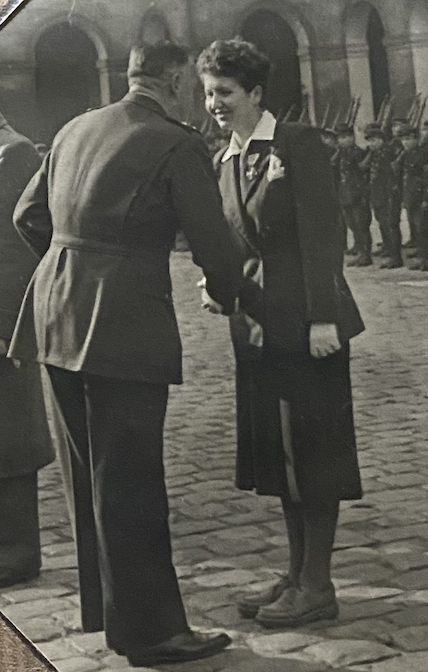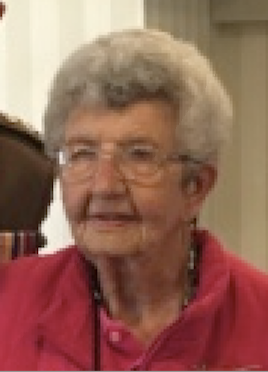THE extraordinary life and service of Nicola Trahan who, as a 16 year old schoolgirl, was a member of the French Resistance but spent her later years volunteering in her parish and at Salisbury Cathedral, is being marked in a memorial service,
Nicola was just 16 when she was parachuted into France to work as a courier for the Resistance, conveying sensitive messages between members on her bicycle.
Born in Berck in the Pas de Calais in France in 1926, she was the daughter of Jeanne Marie Laure Bourzes and André Jean Emile Trahan and grew up in both France and the UK. She was bilingual in English and French and badgered her parents to let her work for the Resistance when war broke out.
Nicola Trahan's French military record, held at the French military archives at Vincennes, records that while still a 16-year-old schoolgirl, she was part of the Forces françaises de l'Intérieur (French Forces of the Interior), the resistance organisation run by the Gaullist French authorities in London.
Nicola spoke in later life of her memories of being parachuted into France and being given the codename ‘Teddy’ as part of her work for the Special Operations Executive, a covert group conducting espionage in Vichy France. However no records of her service in the SOE remain to corroborate her memories, with many believed to have been lost in a catastrophic fire at the end of the Second World War. Nicola explained that she was not trained as an agent, but worked solely as a courier.
Speaking to the Salisbury Journal when she was awarded her MBE, she described her exploits, saying: “A teenage girl was far less likely to arouse suspicion than a brawny young man. I did observation work, watching German troop movements, and liaising with the French.”
As well as the Croix de Guerre in 1947, she was also awarded the Médaille de la Reconnaissance française, the now discontinued honour instituted in 1917 to recognise the French government’s gratitude to those who, without legal or military obligation, had come to the aid of the nation.
Nicola returned to the UK in the early 1950s, training as a nurse in Manchester and becoming a registered nurse in 1953. She was naturalised as a British citizen in 1957.
In 1989, she was awarded an MBE for dedicating 50 years to the Soldiers Sailors and Airmen's Families Association as a midwife and volunteer helping serving personnel and veterans.
She settled on the Salisbury Plain and volunteered at her parish church in Orcheston, where today’s memorial service is being held, and at Salisbury Cathedral, where she spent almost 28 years working in the gift shop every Friday. She died last month aged 97 and left her body to science.
Neighbours in Orcheston describe a determined woman who was reserved about her wartime heroism.
Neighbour and friend Richard Essberger said: “She was a friend, yes, and like all I held her in great respect. To try and catch something of that strange mixture of faith, service and the occasionally forbidding nature that was Nicola, three things: in earlier years I always thought, on spotting that magnificent, heavy stick she carried, "If I met Nicola in a dark alley, so to speak, it wouldn't be me who'd be coming out alive at the other end."
“Then, in the last year or so of her life it became weekly more difficult for her to take a lift to church each Sunday. She would always say, "I know God is with me wherever I am, that will be enough for me." But I especially like what the Revd Stéphane Javelle, until recently our French curate in Orcheston and in the Benefice, said on hearing of her death: ‘I bet she will be greatly missed in the Benefice, what a wonderful character! And, so typical of her, by giving her body to the university, Nicola serves beyond her own death!’”
 Canon Eleanor Rance is leading today’s memorial service. She said: “Nicola was so unassuming in life that many of her neighbours and fellow parishioners knew little of her wartime experiences until she died. Among Nicola’s papers was a newspaper article from 1947. The buildings of Valencay, devastated by enemy action in August 1944 are pictured at the top of the page. Across the image, Nicola’s mother wrote: “These ruins were not made by bombs blindly falling here and there, but by the striking of matches carefully calculated to communicate fire to pools of petrol in this house and that, in the presence of the inmates that were bidden to stand by and remain silent. This along with the fact that my girl saw the horror of it all and that she might have been through martyrdom had she been discovered, makes these views look more tragic to me than any other ones.”
Canon Eleanor Rance is leading today’s memorial service. She said: “Nicola was so unassuming in life that many of her neighbours and fellow parishioners knew little of her wartime experiences until she died. Among Nicola’s papers was a newspaper article from 1947. The buildings of Valencay, devastated by enemy action in August 1944 are pictured at the top of the page. Across the image, Nicola’s mother wrote: “These ruins were not made by bombs blindly falling here and there, but by the striking of matches carefully calculated to communicate fire to pools of petrol in this house and that, in the presence of the inmates that were bidden to stand by and remain silent. This along with the fact that my girl saw the horror of it all and that she might have been through martyrdom had she been discovered, makes these views look more tragic to me than any other ones.”
"Today we gave thanks for the courage of this young girl. But we also commended to God’s care a friend; a strong, compassionate and dedicated woman. We bade her farewell with both the words of the Nunc Dimittis and the bugle calls of the Last Post & Reveille, in sure and certain hope of the resurrection."


